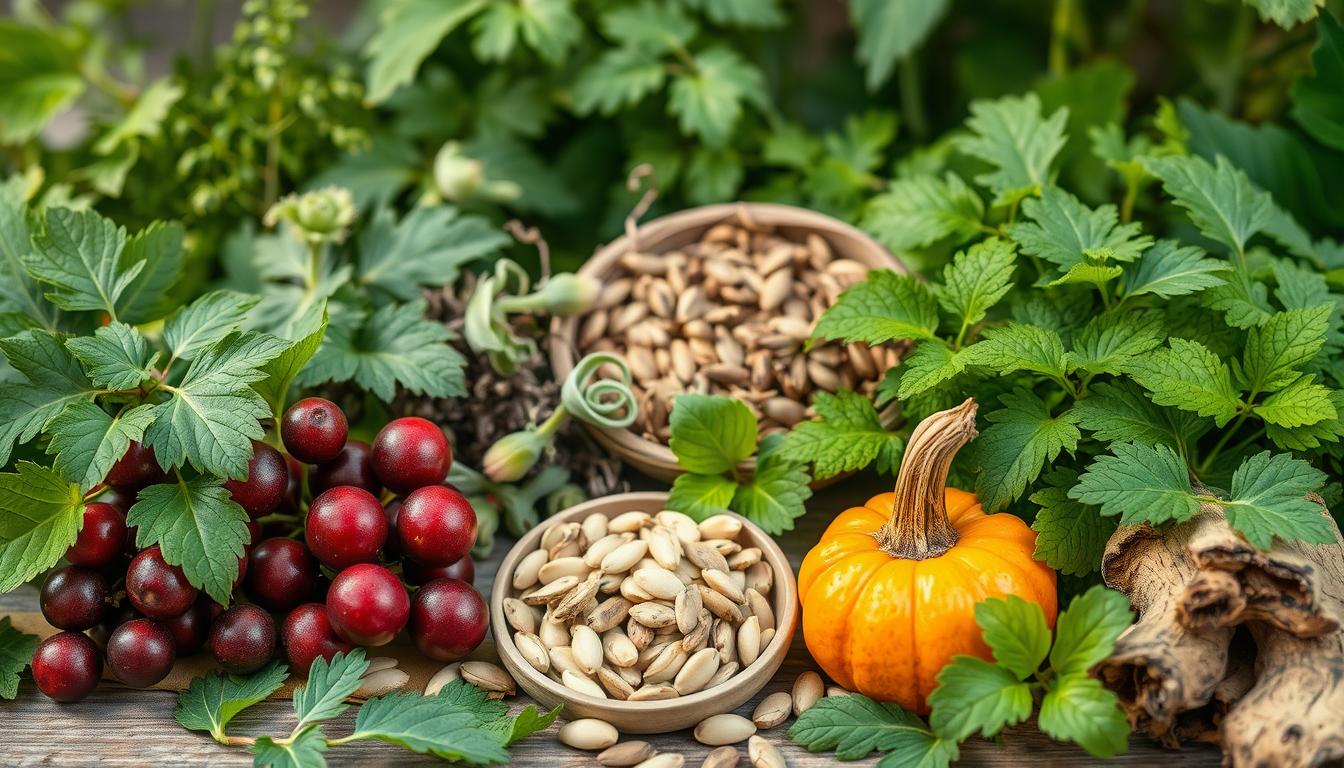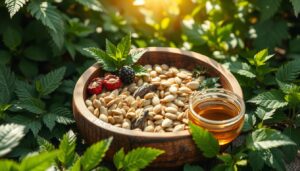Benign Prostatic Hyperplasia (BPH), a common condition affecting men over 50, can cause uncomfortable urinary symptoms such as difficulty starting and maintaining a steady stream, frequent trips to the bathroom, and disruptive nighttime trips. While traditional treatments are available, many men are turning to natural remedies to relieve symptoms of enlarged prostate naturally. Herbs like saw palmetto, pygeum, and stinging nettle have shown promise in reducing BPH symptoms and promoting overall prostate health.
As herbal remedies for prostate and natural prostate treatments gain popularity, it’s important to understand the underlying causes of BPH and the potential benefits of incorporating these botanicals into a comprehensive approach to managing prostate health.
Key Takeaways
- Benign Prostatic Hyperplasia (BPH) is a common condition affecting up to 90% of men over 80 years old.
- Natural remedies like saw palmetto, pygeum, and stinging nettle show promise in reducing BPH symptoms.
- Dietary changes, supplements, and lifestyle modifications can also support prostate health.
- Incorporating a combination of natural approaches may provide more effective relief for enlarged prostate.
- Consulting with a healthcare professional is recommended when considering natural treatments for BPH.
Understanding Benign Prostatic Hyperplasia (BPH) and Its Natural Treatment Options
Benign Prostatic Hyperplasia (BPH) is a common condition that affects the majority of men as they age. In fact, most males have a 50% chance of developing BPH by the age of 60, and a 90% chance by the age of 85. This noncancerous enlargement of the prostate gland can lead to a variety of troublesome urinary symptoms, including frequent urination, difficulty urinating, and nocturia (waking up at night to urinate).
Common Symptoms of BPH
- Frequent urination, especially at night (nocturia)
- Difficulty starting and stopping the urine stream
- Feeling of incomplete bladder emptying
- Weak urine flow
- Urgent need to urinate
Why Natural Remedies Are Gaining Popularity
As the prevalence of BPH continues to rise, many men are seeking alternative therapies to manage their symptoms. Natural remedies are gaining popularity due to their potential effectiveness and fewer side effects compared to traditional medications. These enlarged prostate home remedies and alternative therapies for BPH often focus on reducing prostate inflammation and improving overall prostate health.
The Role of Herbal Medicine in Prostate Health
Herbal medicines, such as saw palmetto, pygeum, and stinging nettle, have long been used to reduce prostate swelling naturally and support prostate function. These natural remedies often possess anti-inflammatory and hormone-balancing properties that may be beneficial for managing BPH symptoms.
“A 2019 review found that nettle root extracts can effectively reduce BPH symptoms and improve the overall quality of life of people with the condition.”
Saw Palmetto: The Leading Natural Remedy for Prostate Health
Saw palmetto, a palm native to the southeastern United States, has long been touted as a natural solution for prostate health. As a popular herbal supplement for the treatment of benign prostatic hyperplasia (BPH), saw palmetto has demonstrated promising results in alleviating common symptoms associated with an enlarged prostate.
One of the key mechanisms by which saw palmetto exerts its benefits is through its action as a 5-alpha-reductase inhibitor. This enzyme plays a crucial role in the conversion of testosterone to dihydrotestosterone (DHT), a potent androgen that can contribute to prostate enlargement. By inhibiting 5-alpha-reductase, saw palmetto helps regulate DHT levels, potentially reducing the size and discomfort of the prostate.
Studies have also highlighted saw palmetto’s anti-inflammatory properties, which may further contribute to its effectiveness in managing BPH symptoms. Many men have reported experiencing a reduction in nighttime urination, improved urine flow, and relief from painful urination after incorporating saw palmetto into their daily regimen.
“Saw palmetto has been used for centuries in traditional medicine to support prostate health, and modern research has validated its potential benefits for men with BPH.”
The recommended dosage for saw palmetto is typically between 160 to 320 micrograms taken twice daily. It’s important to note that while saw palmetto is generally well-tolerated, some individuals may experience mild side effects such as nausea, stomach discomfort, or even erectile dysfunction. As with any supplement, it’s wise to consult with a healthcare professional before incorporating saw palmetto into your natural prostate treatments.

Overall, saw palmetto remains a popular and promising natural remedy for supporting prostate health and managing the symptoms of BPH. As part of a comprehensive approach to prostate care, this herbal supplement can be a valuable addition to one’s healthcare regimen.
Powerful Herbal Combinations: Pygeum and Stinging Nettle
When it comes to natural remedies for an enlarged prostate, the combination of pygeum and stinging nettle has emerged as a potent duo. These two herbal extracts work synergistically to address the common symptoms of Benign Prostatic Hyperplasia (BPH).
How Pygeum Affects Prostate Health
Pygeum africanum, extracted from the bark of the African plum tree, contains a wealth of antioxidant and anti-inflammatory compounds that benefit the urogenital system. Studies have shown that pygeum can help reduce urinary frequency, improve urine flow, and alleviate other BPH-related discomforts.
Benefits of Stinging Nettle for BPH
Stinging nettle root extracts have also demonstrated efficacy in managing BPH symptoms. Stinging nettle has been found to effectively reduce IPSS (International Prostate Symptom Score), serum PSA levels, and prostate size in BPH patients. This herb’s anti-inflammatory and anti-proliferative properties make it a valuable natural treatment option.
Recommended Dosages and Usage
The recommended dosage for pygeum is typically 50 to 100 micrograms taken twice daily. For stinging nettle, the dosage range is 400 to 600 milligrams per day. Many healthcare providers recommend using these herbs in combination with saw palmetto for enhanced effects in managing BPH symptoms.
| Herb | Recommended Dosage |
|---|---|
| Pygeum | 50 to 100 micrograms, twice daily |
| Stinging Nettle | 400 to 600 milligrams per day |
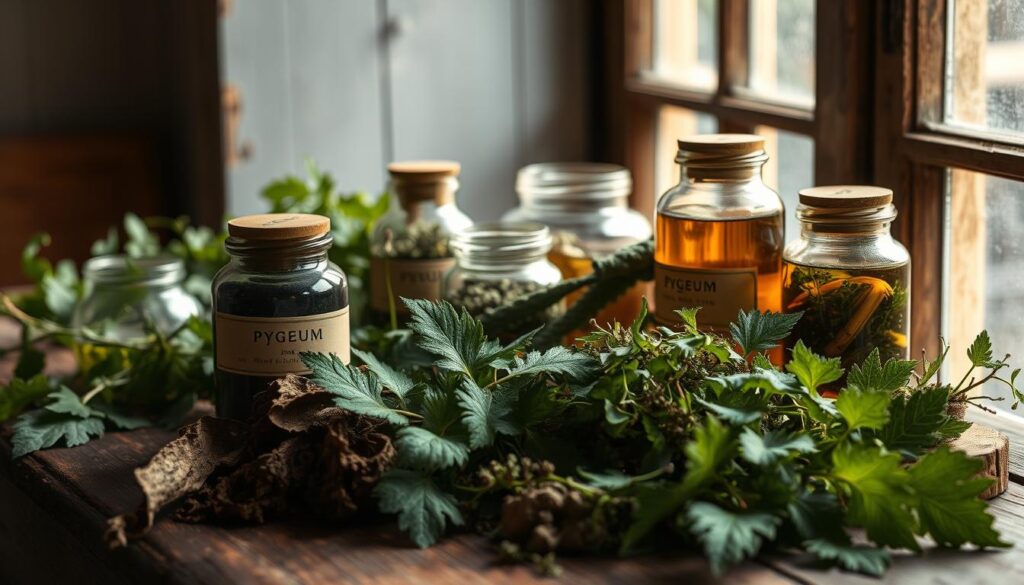
By incorporating these powerful herbal remedies into a comprehensive prostate health regimen, men can find natural and effective relief from the bothersome symptoms of enlarged prostate. The synergistic effects of pygeum and stinging nettle make them a dynamic duo in the realm of herbal remedies for prostate and natural prostate treatments.
Relieve Symptoms of Enlarged Prostate Naturally with Diet Modifications
If you’re one of the up to 90% of men over 85 affected by an enlarged prostate, also known as benign prostatic hyperplasia (BPH), making certain diet changes may help relieve your symptoms naturally. Incorporating more fruits, vegetables, and whole grains into your meals can make a significant difference.
Foods high in zinc, omega-3 fatty acids, and lycopene are particularly beneficial for prostate health. Soy products, pumpkin seeds, and tomatoes are all excellent choices. Limiting your intake of saturated fats, caffeine, and alcohol can also help manage BPH symptoms.
Interestingly, cranberries and green tea have shown potential benefits for prostate health as well. A study published in the British Journal of Nutrition found that men who took a cranberry supplement for six months experienced improvements in their BPH symptoms.
By making strategic diet modifications, you can take a proactive approach to managing your enlarged prostate and relieve symptoms of enlarged prostate naturally. Remember, a healthy, balanced diet is key to supporting overall prostate wellness.

It’s worth noting that 71% of people stop taking their medications for BPH within a year due to side effects like drop in blood pressure, dizziness, fatigue, and erectile dysfunction. That’s why exploring natural remedies, like dietary changes, can be a valuable alternative for many men seeking relief from BPH.
Essential Nutrients and Supplements for Prostate Health
Maintaining a healthy prostate often requires a comprehensive approach, including key nutrients and supplements. Let’s explore the essential elements that can support prostate function and potentially reduce prostate swelling naturally.
Zinc and Prostate Function
Zinc is a crucial mineral for prostate health. Studies show that zinc deficiency is linked to an increased risk of prostate supplements like benign prostatic hyperplasia (BPH). Ensuring adequate zinc intake through dietary sources or supplementation can help maintain healthy prostate function.
Omega-3 Fatty Acids Benefits
Omega-3 fatty acids, found in foods like fatty fish and certain plant oils, have demonstrated potential benefits for prostate health. Research suggests that omega-3s may enhance the effects of standard prostate medications, offering a complementary approach to managing prostate-related issues.
Lycopene-Rich Foods
Lycopene, a powerful antioxidant found primarily in tomatoes, has been studied for its positive effects on the prostate. Consuming lycopene-rich foods can help combat inflammation and oxidative stress, which are often associated with prostate problems.
In addition to these key nutrients, other supplements like beta-sitosterol, a plant-based fat, and flower pollen extracts have also shown promise in providing prostate supplements and supporting overall prostate health. As with any supplement, it’s important to consult with a healthcare professional before incorporating them into your routine.
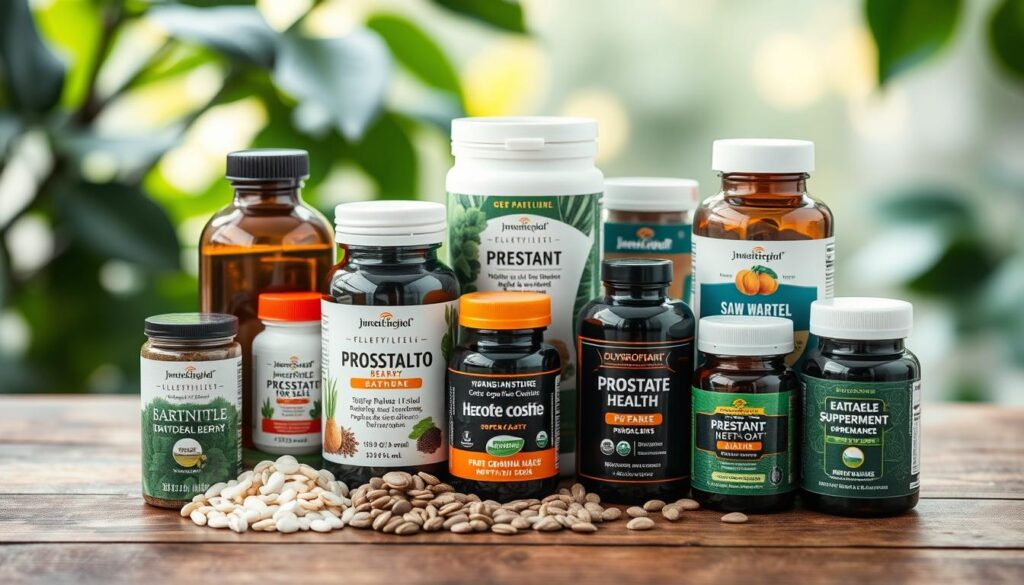
“Maintaining prostate health through a holistic approach, including targeted nutrients and supplements, can be an effective way to address common prostate issues and promote overall well-being.”
Green Tea and Natural Plant Compounds for BPH Relief
For men experiencing the bothersome symptoms of an enlarged prostate, or benign prostatic hyperplasia (BPH), natural remedies are gaining increasing attention. One promising option is the power of green tea and its active compounds.
Green tea contains a powerful polyphenol called epigallocatechin-3-gallate (EGCG), which has demonstrated anti-inflammatory and antioxidant properties. Studies suggest that green tea supplements may help improve BPH symptoms, such as urine flow and sexual function.
Other natural plant compounds have also shown potential in managing BPH. Rye grass pollen extract and beta-sitosterol, a plant sterol, have been associated with modest improvements in urinary symptoms and prostate size. Saw palmetto and red stinkwood are herbal remedies that have demonstrated efficacy in alleviating BPH symptoms, though caution is advised due to possible interactions with medications.
| Natural Remedy | Potential Benefits for BPH |
|---|---|
| Green Tea | Improves urine flow and sexual function |
| Rye Grass Pollen Extract | Reduces urinary symptoms and prostate size |
| Beta-sitosterol | Alleviates urinary symptoms |
| Saw Palmetto | Reduces BPH symptoms, but caution advised |
| Red Stinkwood | Helps manage BPH symptoms, but caution advised |
As with any natural or herbal remedy, it’s essential to consult with a healthcare professional before incorporating them into your prostate health regimen. They can provide guidance on appropriate dosages and potential interactions with any medications you may be taking. By exploring these natural natural prostate treatments and herbal remedies for prostate, men can find relief and support their overall prostate wellbeing.
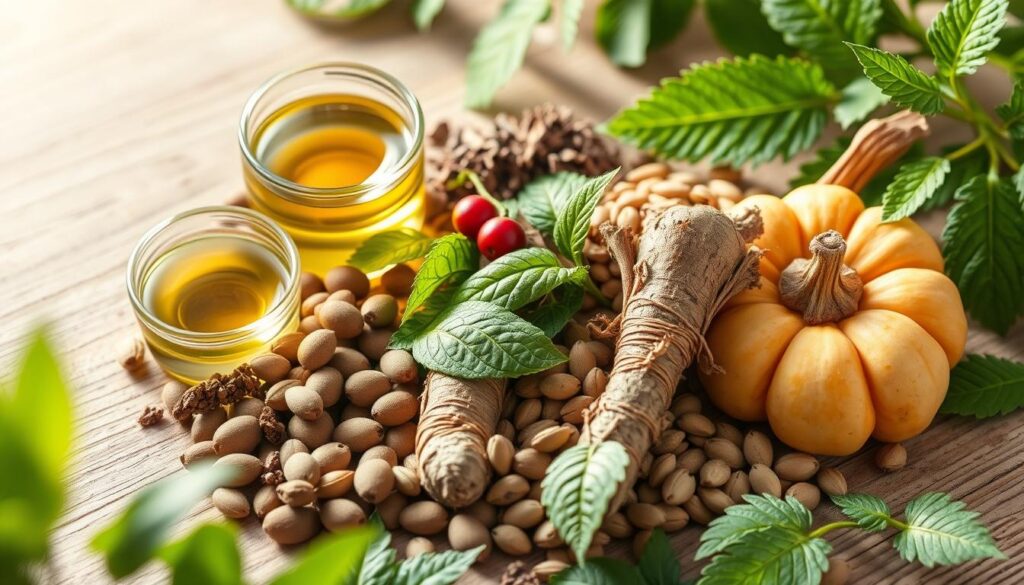
Lifestyle Changes to Support Prostate Health
In addition to herbal remedies and dietary modifications, making lifestyle changes can significantly improve prostate health and relieve the symptoms of an enlarged prostate, also known as benign prostatic hyperplasia (BPH). Regular exercise, stress management techniques, and bladder training methods can all contribute to better prostate function and enhanced quality of life.
Exercise and Physical Activity
Regular exercise, particularly pelvic floor exercises, can help manage BPH symptoms. Kegel exercises, where you contract and relax the pelvic floor muscles, can alleviate urinary issues and improve bladder control. Aim to perform these exercises 10-20 times, 2-3 times per day, to see a noticeable difference.
Stress Management Techniques
Reducing stress can also help alleviate urinary symptoms associated with BPH. Practices like yoga, meditation, and deep breathing can be effective in managing stress and promoting overall well-being. By incorporating these stress-reducing techniques into your daily routine, you may experience a reduction in prostate-related discomfort.
Bladder Training Methods
Bladder training methods, such as double voiding and scheduled urination, can improve bladder control and reduce the frequency of urination. Double voiding involves emptying the bladder completely by waiting a few seconds between urination sessions. Scheduled urination, where you urinate at predetermined intervals, can also help manage BPH symptoms.
Maintaining a healthy weight and avoiding fluid intake before bedtime are additional lifestyle modifications that can support prostate health and relieve symptoms of enlarged prostate naturally. By incorporating these exercises for prostate gland and lifestyle changes, you can take a proactive approach to managing your prostate health and improving your overall quality of life.
Traditional Asian Herbs and Remedies for Prostate Care
Traditional Asian medicine offers a diverse array of herbs and remedies that have shown potential in supporting prostate health and managing the symptoms of benign prostatic hyperplasia (BPH). Chinese herbal formulations containing ingredients like Rehmannia glutinosa and Cornus officinalis have been used for thousands of years to address urination-related disorders and prostate conditions, including prostatitis, BPH, and even prostate cancer.
The traditional Chinese herbal formula Danggui Beimu Kushen Wan (DBKW) has been consistently documented in numerous historical texts for its efficacy in managing difficult urination and prostate-related issues. This formula, containing a specific 1:1:1 ratio of Angelicae Sinensis Radix, Fritillariae Thunbergii Bulbus, and Sophorae Flavescentis Radix, has been prescribed in dosages ranging from 3 to 10 pills per dose to address the primary indication of difficult urination with heat stagnation.
While more research is still needed to fully understand the safety and efficacy of these traditional Asian remedies, the rich history and continued use of these natural approaches suggest promising avenues for those seeking alternative therapies to manage BPH and support overall prostate health. As always, it’s important to consult with healthcare professionals before incorporating any new herbal supplements or remedies into your prostate care routine.
FAQ
What are the common symptoms of Benign Prostatic Hyperplasia (BPH)?
Why are natural remedies becoming popular for treating BPH?
What are some of the herbal medicines used for prostate health?
How does saw palmetto help with BPH?
What are the benefits of pygeum and stinging nettle for prostate health?
How can dietary changes help manage BPH symptoms?
What are the essential nutrients and supplements for prostate health?
How can lifestyle changes support prostate health?
What traditional Asian herbs and remedies are used for prostate care?
Source Links
- Best Drinks for Enlarged Prostate (BPH): Green Tea and More
- Enlarged Prostate: Herbal Therapy | HealthLink BC
- Natural Remedies for an Enlarged Prostate – Institute for Natural Medicine
- 10 natural remedies for enlarged prostate and lifestyle tips
- 6 Natural Remedies for Enlarged Prostate
- Saw Palmetto for Enlarged Prostate
- Saw palmetto Information | Mount Sinai
- PYGEUM: Overview, Uses, Side Effects, Precautions, Interactions, Dosing and Reviews
- The Efficacy of Stinging Nettle (Urtica Dioica) in Patients with Benign Prostatic Hyperplasia: A Randomized Double-Blind Study in 100 Patients
- African Cherry & Stinging Nettle
- Natural Remedies for Enlarged Prostate
- Natural Ways To Treat An Enlarged Prostate: Midwest Institute for Non-Surgical Therapy: Vascular and Interventional Radiologists
- What to Know About Supplements and Prostate Health
- Prostate Health and Supplements: Know the Facts
- The 6 Most Effective Natural Remedies for an Enlarged Prostate | HALO Precision Diagnostics
- Green tea for BPH: Does it work?
- 10 Great Foods For Prostate Health – Alliance Urology
- BPH: Does diet play a role?
- Treating an Enlarged Prostate With Natural Remedies
- How To Shrink An Enlarged Prostate Naturally – 4 Surprisingly Different Remedies: Midwest Institute for Non-Surgical Therapy: Vascular and Interventional Radiologists
- Herbal formula (Danggui Beimu Kushen Wan) for prostate disorders: a systematic review of classical literature
- Chinese Medicine Treatment of Benign Prostatic Hyperplasia

